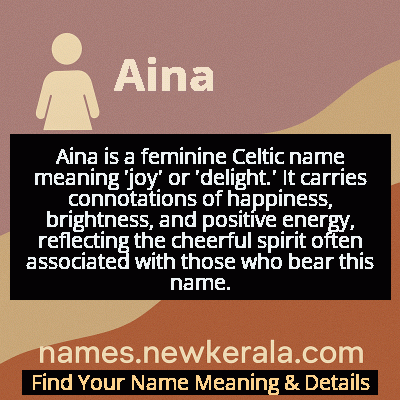Aina Name Meaning & Details
Origin, Popularity, Numerology Analysis & Name Meaning of Aina
Discover the origin, meaning, and cultural significance of the name AINA. Delve into its historical roots and explore the lasting impact it has had on communities and traditions.
Name
Aina
Gender
Female
Origin
Celtic
Lucky Number
7
Meaning of the Name - Aina
Aina is a feminine Celtic name meaning 'joy' or 'delight.' It carries connotations of happiness, brightness, and positive energy, reflecting the cheerful spirit often associated with those who bear this name.
Aina - Complete Numerology Analysis
Your Numerology Number
Based on Pythagorean Numerology System
Ruling Planet
Neptune (Ketu)
Positive Nature
Intuitive, analytical, spiritual, and inquisitive.
Negative Traits
Secretive, reserved, aloof, and can be overly critical.
Lucky Colours
Green, yellow.
Lucky Days
Monday.
Lucky Stones
Cat’s eye, moonstone.
Harmony Numbers
1, 5, 6.
Best Suited Professions
Scientists, researchers, spiritual leaders, detectives.
What People Like About You
Depth of knowledge, analytical skills, spirituality.
Famous People Named Aina
Aina Wifalk
Inventor and Disability Rights Advocate
Invented the modern rollator walker in 1978
Aina Berg
Swimmer
Olympic bronze medalist in 1920 Summer Olympics
Aina Clotet
Actress
Recognized Catalan actress known for versatile performances
Name Variations & International Equivalents
Click on blue names to explore their detailed meanings. Gray names with will be available soon.
Cultural & Historical Significance
Beyond Irish mythology, the name has been adopted and adapted across various European cultures, each adding their own nuances while preserving the core meaning of joy and brightness. In Scandinavian countries, Aina became popular in the early 20th century, while in Basque culture it evolved into Ainara. This cross-cultural adoption demonstrates the universal appeal of the name's positive connotations. The enduring cultural significance of Aina lies in its ability to bridge ancient traditions with modern sensibilities, carrying forward the Celtic appreciation for light, joy, and feminine strength into contemporary naming practices.
Extended Personality Analysis
Individuals named Aina are typically characterized by their radiant optimism and genuine warmth that draws people toward them. They possess a natural ability to find joy in everyday moments and often serve as emotional anchors for their friends and family. Their cheerful disposition is complemented by strong intuitive abilities, allowing them to understand and respond to the emotional needs of others with remarkable sensitivity. Ainas tend to be creative problem-solvers who approach challenges with a positive mindset and innovative thinking.
In social settings, Ainas are often the heart of their circles—energetic, engaging, and skilled at creating inclusive environments where everyone feels valued. They balance their extroverted qualities with deep introspection and emotional intelligence. While generally easy-going, they demonstrate surprising resilience and determination when pursuing their goals or protecting loved ones. Their joyfulness is not superficial but stems from a profound appreciation for life's beauty and a commitment to living authentically. This combination of light-heartedness and emotional depth makes Ainas both inspiring and dependable companions throughout life's journey.
Modern Usage & Popularity
In contemporary naming practices, Aina enjoys a distinctive position as a name that balances cultural heritage with modern appeal. While not among the most popular names globally, it has maintained steady usage particularly in Scandinavian countries like Sweden and Norway, where it experienced peak popularity in the early to mid-20th century. Recently, the name has seen renewed interest among parents seeking meaningful names with Celtic roots but international accessibility. In the United States, Aina remains uncommon but has appeared with increasing frequency in states with strong Irish-American communities and among families valuing unique cultural names. The name's appeal lies in its simplicity, positive meaning, and cross-cultural versatility, making it suitable for families of diverse backgrounds who appreciate its joyful connotations and elegant sound. Digital globalization has also contributed to its modest resurgence, as parents discover the name through online resources exploring Celtic and Nordic naming traditions.
Symbolic & Spiritual Meanings
Symbolically, Aina represents the transformative power of joy and the human capacity for radiating positive influence. It embodies the concept that genuine happiness is not merely an emotional state but a fundamental force that can shape realities and uplift communities. The name carries solar symbolism, connecting it to light, warmth, and the life-sustaining energy of the sun—making it representative of vitality, growth, and renewal. In metaphorical terms, Aina symbolizes the inner light that guides individuals through darkness and the resilience that comes from maintaining optimism. It also represents the feminine principle of nurturing warmth and emotional intelligence, serving as a reminder that strength often manifests through compassion and connection rather than force. The name's symbolic resonance extends to concepts of sovereignty and self-possession, reflecting the Celtic understanding that true joy emerges from living authentically and in harmony with one's values and community.

